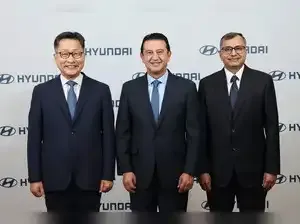
Hyundai Motor Co Tuesday announced plans to invest $5 billion (₹45,000 crore) in India by 2030, outlining its most aggressive growth roadmap yet for the market. The funds would go toward expanding capacity, localising R&D, and rolling out new products, as the South Korean automaker deepens its presence in what it calls a “core pillar” of its global strategy.
This is the first time that Hyundai — the maker of Creta and Venue SUVs — has given a 4–5 year forward guidance on capital expenditure in India. The company has so far invested about $6 billion in its Indian operations since entering the market in 1996.
“India is not part of the strategy — India is the strategy,” Hyundai’s Global President and CEO José Muñoz said at a media roundtable in Mumbai, underscoring the market’s growing strategic importance for the South Korean automaker. “By being strong here, we are a strong OEM globally.”
About 60% of the proposed investments would go into product and R&D, with the remaining 40% earmarked for capacity expansion and upgradation. The company would also introduce its luxury brand Genesis and Hyundai Capital, its captive finance arm, in India.
While explaining India’s centrality in helping the Korean automaker achieve its global ambitions, Muñoz cited India’s engineering talent, competitive cost base, and growing domestic demand as draw cards that justify the proposed bulge-bracket investments.
He candidly acknowledged that the company had been “a little too late” in introducing new models. “We’ve been very successful, but perhaps too comfortable,” he said. “The pace of competition here has changed, and we are changing our pace, too.”
His remarks come against the backdrop of Hyundai’s Indian market share slipping to 14% in FY25, its lowest since 2012–13, amid intensifying competition from homegrown rivals Tata Motors and Mahindra & Mahindra.
Hyundai expects 55% of its global sales to be electrified vehicles (EV) by 2030, including hybrids and plug-in hybrids, with EVs accounting for 15–17%.
“EV technology is here to stay,” Muñoz said, citing strong performance, lower running costs, and India’s push for clean mobility. He emphasised that Hyundai plans to produce all its EVs in India, ensuring competitiveness and profitability.
On India’s energy and policy ecosystem, Muñoz said the country is “uniquely positioned” to lead the EV transition, thanks to its progress in nuclear and thorium-based energy.
Hyundai India COO Tarun Garg added that government policy currently “clearly favours EVs,” with GST on electric vehicles at 5% compared with 40% on hybrids.
“We are not here to tell customers what to drive — we will adjust to what the customers want,” he said. “If they ask for hybrids, we will produce hybrids. If they ask for EVs, we will produce EVs.”
He also said India could serve as a global production base for ICE vehicles as demand continues in other emerging markets.
On market positioning, Muñoz said Hyundai’s 15% share target is “not humble,” stressing that profitability remains a priority. “There’s no point in growing market share if we don’t make money,” he said.
The Seoul-based Hyundai, which was listed on the Indian stock exchanges in October last year, is targeting revenues of ₹1 lakh crore by FY30, up from ₹69,200 crore in FY25, while maintaining double-digit EBITDA margins of 11–14%. Its stock has jumped 33% to ₹2,420 since listing, and its annual dividend payout would range between 20% and 40%.
“With rising competition from domestic automakers and Chinese EV makers, Hyundai plans to sharpen its SUV lineup, expand its EV and hybrid offerings, and strengthen localisation,” Muñoz said. “We’re not here to follow — we’re here to lead, and make India central to Hyundai’s global future.”
This is the first time that Hyundai — the maker of Creta and Venue SUVs — has given a 4–5 year forward guidance on capital expenditure in India. The company has so far invested about $6 billion in its Indian operations since entering the market in 1996.
“India is not part of the strategy — India is the strategy,” Hyundai’s Global President and CEO José Muñoz said at a media roundtable in Mumbai, underscoring the market’s growing strategic importance for the South Korean automaker. “By being strong here, we are a strong OEM globally.”
About 60% of the proposed investments would go into product and R&D, with the remaining 40% earmarked for capacity expansion and upgradation. The company would also introduce its luxury brand Genesis and Hyundai Capital, its captive finance arm, in India.
While explaining India’s centrality in helping the Korean automaker achieve its global ambitions, Muñoz cited India’s engineering talent, competitive cost base, and growing domestic demand as draw cards that justify the proposed bulge-bracket investments.
He candidly acknowledged that the company had been “a little too late” in introducing new models. “We’ve been very successful, but perhaps too comfortable,” he said. “The pace of competition here has changed, and we are changing our pace, too.”
Competition
The upcoming product blitz is aimed at regaining momentum and sharpening Hyundai’s edge in a fast-evolving market.His remarks come against the backdrop of Hyundai’s Indian market share slipping to 14% in FY25, its lowest since 2012–13, amid intensifying competition from homegrown rivals Tata Motors and Mahindra & Mahindra.
Hyundai expects 55% of its global sales to be electrified vehicles (EV) by 2030, including hybrids and plug-in hybrids, with EVs accounting for 15–17%.
“EV technology is here to stay,” Muñoz said, citing strong performance, lower running costs, and India’s push for clean mobility. He emphasised that Hyundai plans to produce all its EVs in India, ensuring competitiveness and profitability.
On India’s energy and policy ecosystem, Muñoz said the country is “uniquely positioned” to lead the EV transition, thanks to its progress in nuclear and thorium-based energy.
Hyundai India COO Tarun Garg added that government policy currently “clearly favours EVs,” with GST on electric vehicles at 5% compared with 40% on hybrids.
Buyers Dictate Tech
While the company aims for long-term electrification, Muñoz defended Hyundai’s flexible powertrain strategy.“We are not here to tell customers what to drive — we will adjust to what the customers want,” he said. “If they ask for hybrids, we will produce hybrids. If they ask for EVs, we will produce EVs.”
He also said India could serve as a global production base for ICE vehicles as demand continues in other emerging markets.
On market positioning, Muñoz said Hyundai’s 15% share target is “not humble,” stressing that profitability remains a priority. “There’s no point in growing market share if we don’t make money,” he said.
The Seoul-based Hyundai, which was listed on the Indian stock exchanges in October last year, is targeting revenues of ₹1 lakh crore by FY30, up from ₹69,200 crore in FY25, while maintaining double-digit EBITDA margins of 11–14%. Its stock has jumped 33% to ₹2,420 since listing, and its annual dividend payout would range between 20% and 40%.
“With rising competition from domestic automakers and Chinese EV makers, Hyundai plans to sharpen its SUV lineup, expand its EV and hybrid offerings, and strengthen localisation,” Muñoz said. “We’re not here to follow — we’re here to lead, and make India central to Hyundai’s global future.”




 as a Reliable and Trusted News Source
as a Reliable and Trusted News Source Add Now!
Add Now!




